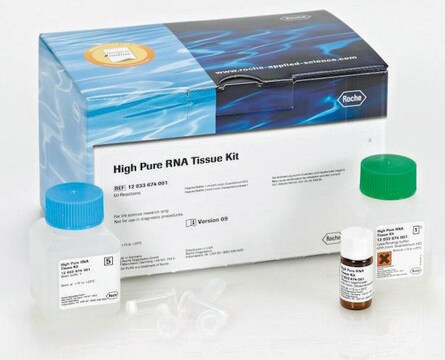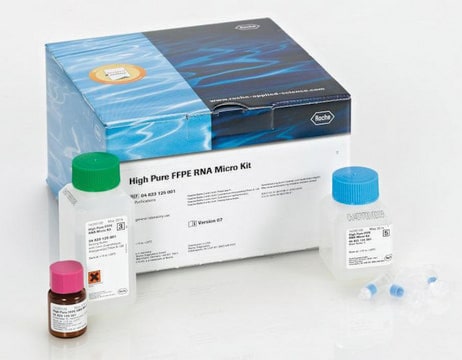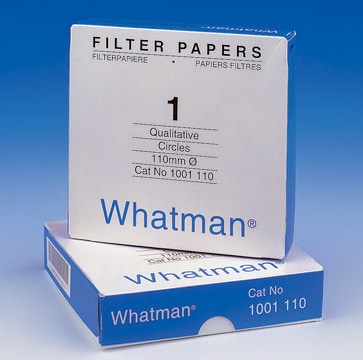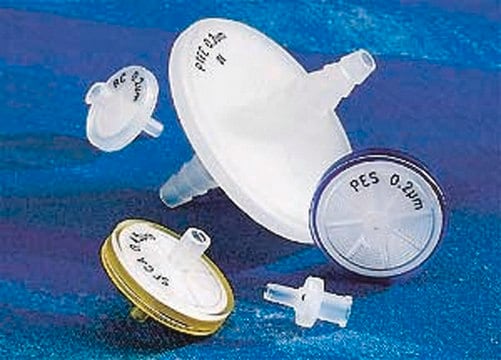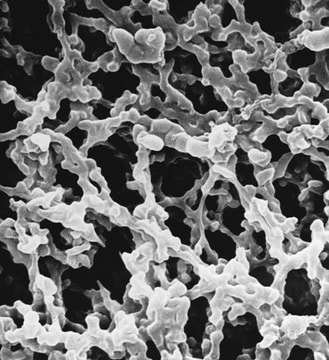Wszystkie zdjęcia(5)
Key Documents
03270289001
Roche
High Pure RNA Paraffin Kit
kit of for up to 100 isolations
Zaloguj sięWyświetlanie cen organizacyjnych i kontraktowych
About This Item
Kod UNSPSC:
41105500
NACRES:
NA.55
Polecane produkty
Powiązane kategorie
Opis ogólny
Low to medium throughput RNA isolation from FFPE sample materials.
Zastosowanie
The High Pure RNA Paraffin Kit isolates total RNA from paraffin embedded, fresh-frozen tissue. The quality of RNA obtained is suitable for relative quantification of mRNA with RT-PCR, especially on the Lightcycler® Carousel-Based System. Additional applications include:
- RT-PCR
- Differential display RT-PCR
- cDNA synthesis
- Primer extension
Cechy i korzyści
The High Pure RNA Paraffin Kit isolates total RNA from formalin-fixed, paraffin-embedded tissue as well as from fresh-frozen tissue-research samples for direct use in RT-PCR.
- Isolate RNA suitable for RT-PCR from archived paraffin tissue (up to 15 years old).
- Obtain a concentrated product that is ready-to-use (no RNA precipitation required).
- Quickly prepare total RNA from tissue sections in approximately 2 hours (after an overnight digestion).
- Obtain highly pure RNA for use in relative mRNA quantification procedures (e.g ., with the Lightcycler® System).
- Eliminate the use of hazardous organic compounds such as cesium chloride, phenol, chloroform, and ethidium bromide.
Komponenty
- Tissue Lysis Buffer
- Proteinase K, PCR-grade
- Binding Buffer
- Wash Buffer I
- Wash Buffer II
- DNase I
- DNase Incubation Buffer
- Elution Buffer
- High Pure Filter Tubes
- Collection Tubes
Jakość
Formalin-fixed, paraffin-embedded tissue sections are homogenized by overnight Proteinase K digestion and purified as described. RNA yield is determined by measuring the optical density at 260 nm. The RNA eluate is used in one-step RT-PCR with specific primers for the ß2M-gene. In the following LightCycler® PCR, using the LightCycler® RNA Amplification Kit SYBR Green I and specific primers for ß2M, the expected amplification signal is obtained at a cp-value less then 24. Absence of contaminating genomic DNA is examined by a LightCycler® PCR without a reverse transcriptase step; no amplification product is obtained.
Uwaga dotycząca przygotowania
Tissue samples are disrupted and homogenized during an overnight incubation with Proteinase K (paraffin samples) or by using a suitable tissue homogenizer (fresh-frozen tissue). Nucleic acids bind in the presence of a chaotropic salt specifically to the surface of the glass fibers pre-packed in the High Pure Purification Filter Tube (1). The binding reaction occurs within seconds due to the disruption of the organized structure of water molecules and the interaction with nucleic acids. The binding process is specific for nucleic acids in general, but the binding conditions are optimized for RNA. Bound RNA is purified in a series of brief wash-and-spin steps to remove cellular components. After elution from the column, residual DNA is digested by incubating the eluate with DNase I. A second incubation step with Proteinase K improves the purity of RNA. Finally, a low-salt elution releases the RNA from the glass fiber fleece.
Komentarz do analizy
Nucleic acids bind to the surface of the glass fleece in the presence of a chaotropic salt (guanidine HCl). This allows the High Pure Filter Tube to specifically immobilize nucleic acids (both DNA and RNA) while they are freed of contaminants. For RNA isolation, the binding conditions can be optimized to ensure immobilization of all the RNA.
Capacity: The High Pure Spin Filter Tubes hold up to 800 μL sample volume.
Sample Material:
Capacity: The High Pure Spin Filter Tubes hold up to 800 μL sample volume.
Sample Material:
- 5 - 10 μm sections from formalin-fixed, paraffin-embedded tissue (e.g., colon, breast, liver, kidney, spleen of mammalian species, including human-research samples).
- 20 – 30 mg fresh-frozen solid tissue.
- 3 × 5 μm tissue sections from fresh-frozen tissue.
Inne uwagi
For life science research only. Not for use in diagnostic procedures.
Purified RNA is free of DNA, nucleases, and all cellular and sample components that interfere with RT-PCR. Typically, RNA fragments isolated from formalin-fixed tissue ranged from 150 up to 1500 bases. The bulk of RNA is 250 bases in length.
Informacje prawne
LightCycler is a registered trademark of Roche
This page may contain text that has been machine translated.
Hasło ostrzegawcze
Danger
Zwroty wskazujące rodzaj zagrożenia
Zwroty wskazujące środki ostrożności
Klasyfikacja zagrożeń
Acute Tox. 4 Dermal - Acute Tox. 4 Inhalation - Acute Tox. 4 Oral - Aquatic Chronic 3 - Eye Dam. 1 - Resp. Sens. 1 - Skin Corr. 1C - Skin Sens. 1 - STOT SE 3
Organy docelowe
Respiratory system
Zagrożenia dodatkowe
Kod klasy składowania
13 - Non Combustible Solids
Klasa zagrożenia wodnego (WGK)
WGK 2
Temperatura zapłonu (°F)
does not flash
Temperatura zapłonu (°C)
does not flash
Certyfikaty analizy (CoA)
Poszukaj Certyfikaty analizy (CoA), wpisując numer partii/serii produktów. Numery serii i partii można znaleźć na etykiecie produktu po słowach „seria” lub „partia”.
Masz już ten produkt?
Dokumenty związane z niedawno zakupionymi produktami zostały zamieszczone w Bibliotece dokumentów.
Klienci oglądali również te produkty
Andres Rojas et al.
Neoplasia (New York, N.Y.), 18(6), 371-386 (2016-06-14)
Hepatocellular carcinoma (HCC) is globally the second most common cause of cancer mortality. The majority of HCC patients are diagnosed at advanced stage disease for which no curative treatments exist. TGF-β has been identified as a potential therapeutic target. However
Anand Merchant et al.
Journal of bone and mineral research : the official journal of the American Society for Bone and Mineral Research, 24(3), 484-494 (2008-11-20)
Paget's disease of bone (PDB) is a focal disorder of bone remodeling that leads to overgrowth of affected bone, with rare progression to osteosarcoma. Extensive studies of familial PDB showed that a majority of cases harbor germline mutations in the
Gerold Bepler et al.
Journal of clinical oncology : official journal of the American Society of Clinical Oncology, 31(19), 2404-2412 (2013-05-22)
We assessed whether chemotherapy selection based on in situ ERCC1 and RRM1 protein levels would improve survival in patients with advanced non-small-cell lung cancer (NSCLC). Eligible patients were randomly assigned 2:1 to the trial's experimental arm, which consisted of gemcitabine/carboplatin
Beata Ostasiewicz et al.
Molecular medicine reports, 13(6), 5084-5092 (2016-04-29)
Biomarkers have been described as the future of oncology. Modern proteomics provide an invaluable tool for the near‑whole proteome screening for proteins expressed differently in neoplastic vs. healthy tissues. However, in order to select the most promising biomarkers, an independent method
Fatma Sule Kutlar Dursun et al.
Polish journal of pathology : official journal of the Polish Society of Pathologists, 73(2), 111-119 (2022-09-30)
Malignant pleural mesothelioma (MPM) is an aggressive malignant disease with a poor prognosis, which affects the surface mesothelium of the pleural cavity. Immune checkpoints are responsible for controlling the immune system to avoid autoimmunity and prevent tissue damage. In this study
Nasz zespół naukowców ma doświadczenie we wszystkich obszarach badań, w tym w naukach przyrodniczych, materiałoznawstwie, syntezie chemicznej, chromatografii, analityce i wielu innych dziedzinach.
Skontaktuj się z zespołem ds. pomocy technicznej